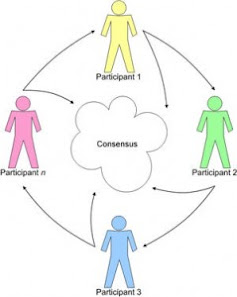In any organization, decision-making could be done by individuals or by a group. Engaging the opinions and diverse perspectives of others within the team enhances the decision-making process, given that multiple opinions are considered in making the best decision. As a result, employing various group decision-making techniques could be critical in making effective decisions. Group decision-making techniques are the different ways of making decisions in a group setting by choosing the right approach that fits the team culture from a diverse group of opinions (Abdel-Basset et al., 2019). As a result, the opinion of everyone on the team is considered, which may lead to a surge in team engagement and productivity. Several group decision-making techniques exist, including the Delphi method, Brainstorming, Weighted Scoring, Nominal Group Technique (NGT), and Possibility Ranking. This post will focus on the Delphi and Weighted Scoring group decision-making techniques.
The Delphi Technique
 The Delphi technique, developed by the RAND Corporation, is an iterative, multistage consensus process where the opinions of individuals are put together in groups (Lange et al., 2020). This approach surveys the opinion of a team to arrive at a group opinion or decision. With the Delphi method, all the ideas generated by the team are complied, and the facilitator breaks down the aggregated list of opinions into smaller possible options, which the group then deliberates upon until a majority decision is made. Condensing the group ideas into fewer options facilitates the group decision-making process backed by the collective agreement of the team members. Unlike the weighted scoring technique, the Delphi approach has three characteristics that distinguish it from other group decision-making techniques: anonymous group interactions and responses, multiple rounds of questioning, and feedback to the team after each round of questioning (Chalmers & Armour, 2019). These characteristics help reduce bias in gaining consensus by eliminating the influence society and peer pressure could have on the decision-making process. The Delphi technique is best when a group consensus is required in making a major decision.
The Delphi technique, developed by the RAND Corporation, is an iterative, multistage consensus process where the opinions of individuals are put together in groups (Lange et al., 2020). This approach surveys the opinion of a team to arrive at a group opinion or decision. With the Delphi method, all the ideas generated by the team are complied, and the facilitator breaks down the aggregated list of opinions into smaller possible options, which the group then deliberates upon until a majority decision is made. Condensing the group ideas into fewer options facilitates the group decision-making process backed by the collective agreement of the team members. Unlike the weighted scoring technique, the Delphi approach has three characteristics that distinguish it from other group decision-making techniques: anonymous group interactions and responses, multiple rounds of questioning, and feedback to the team after each round of questioning (Chalmers & Armour, 2019). These characteristics help reduce bias in gaining consensus by eliminating the influence society and peer pressure could have on the decision-making process. The Delphi technique is best when a group consensus is required in making a major decision.
On the other hand, the Weighted Scoring technique is founded on the premise that some ideas or decision-making approaches may come with more risk when compared to other approaches. As a result, the risk implications of every idea need to be taken into consideration (Mukid et al., 2018). With weighted scoring, decisions are evaluated against cost, business value, risk, and adoption criteria. Each criterion has a score attributed to it based on the weighting or impact it may have on business value, cost, and risk. Thus, the ideal approach will have a high business value, low cost, and less risk to the organization. The weighted scoring group decision-making technique is ideal when the teams have diverse ideas to serve as possible solutions, but these ideas’ impact has not been thoroughly evaluated. As a result, the weighted scoring approach eliminates ideas with high business risk.
References
Abdel-Basset, M., Manogaran, G., Gamal, A., & Smarandache, F. (2019). A Group Decision Making Framework Based on Neutrosophic TOPSIS Approach for Smart Medical Device Selection. Journal of Medical Systems, 43(2), 38. https://doi.org/10.1007/s10916-019-1156-1
Chalmers, J., & Armour, M. (2019). The Delphi technique. Springer. https://doi.org/10.1007/978-981-10-5251-4_99
Lange, T., Kopkow, C., Lützner, J., Günther, K.-P., Gravius, S., Scharf, H.-P., . . . Schmitt, J. (2020). Comparison of different rating scales for the use in Delphi studies: different scales lead to different consensus and show different test-retest reliability. BMC medical research methodology, 20(1), 28-28. https://doi.org/10.1186/s12874-020-0912-8
Mukid, M. A., Widiharih, T., Rusgiyono, A., & Prahutama, A. (2018). Credit scoring analysis using weighted k nearest neighbor. Journal of Physics: Conference Series, 1025(1). https://doi.org/http://dx.doi.org/10.1088/1742-6596/1025/1/012114
-
Mavis Ofehttps://eyongesttech.com/author/admin-eygtech/
-
Mavis Ofehttps://eyongesttech.com/author/admin-eygtech/
-
Mavis Ofehttps://eyongesttech.com/author/admin-eygtech/
-
Mavis Ofehttps://eyongesttech.com/author/admin-eygtech/


